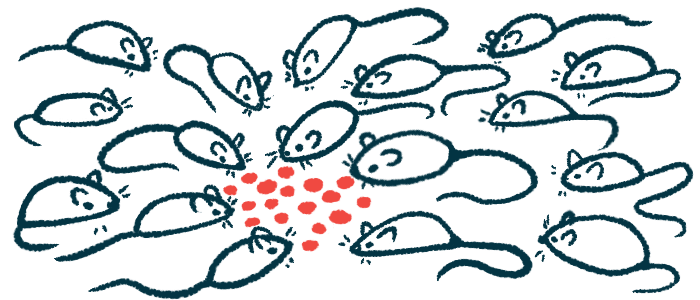High-fiber diet seen to improve memory in Huntington’s mice
Researchers call novel findings on benefits of fiber intake 'very exciting'
Written by |

Eating a high-fiber diet led to improvements in memory and reductions in depression-like behavior in a mouse model of Huntington’s disease, a new study reports.
“What we found is very exciting. For the first time we’ve shown that high-fiber intake not only enhanced gastrointestinal function, it also improved cognition and behavior,” Anthony Hannan, PhD, the study’s senior author at the Florey Institute of Neuroscience and Mental Health, in Australia, said in an institute press release.
Moreover, according to Hannon and the team, their results in mice suggest that dietary fiber may delay the onset of Huntington’s symptoms.
The study, “Dietary fiber confers therapeutic effects in a preclinical model of Huntington’s disease,” was published in Brain, Behavior, and Immunity.
Investigating the gut-brain connection in Huntington’s
Huntington’s is a progressive neurodegenerative disease caused by mutations in the HTT gene that lead to the formation of toxic clumps of the huntingtin protein. This results in a range of symptoms that include motor, cognitive, and psychiatric problems.
Increasing evidence supports the existence and importance of a connection between the gut and the brain, as well as its involvement in neurodegenerative diseases.
In fact, bowel problems have been reported in Huntington’s patients, and Hannan and colleagues previously showed that people carrying HTT mutations have a distinct gut microbiota profile relative to non-carriers.
The gut microbiota comprises the vast community of friendly microorganisms that colonize the gastrointestinal tract and help maintain a balanced gut function. They also protect against disease-causing organisms and influence a person’s immune system.
Additional studies have reported associations “between microbes differentially [present] in HD [Huntington’s disease] patients with inflammatory markers and cognitive performance,” the researchers wrote.
Dietary fiber is plant material in foods that the human body doesn’t digest, but that helps bowel movements and is metabolized by the gut bacteria into molecules known to regulate gut function. Such molecules also are known to be involved in the microbiota-gut-brain axis.
In this study, scientists used a mouse model of Huntington’s to test the effects of dietary fiber on gastrointestinal function, cognitive function, and behavior. The animals were fed diets containing 10% fiber, 5% fiber, or no fiber.
“Working with a preclinical model, we tested the impact of high, medium and zero levels of dietary fiber consumption,” Hannan said.
The results showed that mice fed the high-fiber diet showed significantly better non-spatial short-term learning and memory, as assessed with the novel object recognition test.
High-fiber diet found to improve digestive health in mouse model
Further, mice on the high-fiber diet also kept swimming for significantly longer periods during the Porsolt swim test. This test is used as a measure of depression-like behavior, with longer swimming times indicating less depression.
Tests of spatial short-term learning and memory, and assessments of motor function, showed similar scores to the swim test between mice fed different levels of fiber.
These findings indicate that high-fiber diet was “successful in ameliorating behavioral deficits, modelling neurological and psychiatric symptoms, in HD mice,” the team wrote, adding that a “high-fiber diet might have therapeutic potential in clinical HD.”
Moreover, the high-fiber diet showed notable benefits for the mice’s digestive health.
Mice with Huntington’s-like disease characteristically have less water in their stools, which causes feces to be harder and contributes to constipation. Mice fed the high-fiber diet had significantly higher stool water content, so their feces were softer and their gut transit time dropped to that of healthy mice. In addition, the high-fiber was associated with signs of less gut inflammation.
These findings indicate that dietary fiber interventions may have therapeutic potential in Huntington’s disease.
Analyses of the mice’s gut microbiota showed that the high-fiber diet led to changes in the relative abundance of certain types of bacteria. Diet-induced changes were different between the mouse model and mice without Huntington’s, the team noted.
“The gut microbiome in our mouse model of Huntington’s, carrying the human disease gene mutation, responded differently to the high fiber intake compared to the non-Huntington’s mice. This is consistent with our previous discovery that the gut microbiome is altered in Huntington’s disease,” said Carolina Gubert, one of the study’s co-first authors at the Florey.
The researchers proposed that changes in the gut microbiome may contribute to cognitive and behavioral effects of the high-fiber diet. They stressed, however, that additional studies will be needed to verify these results and determine exactly how a high-fiber diet affects Huntington’s.
One area for further study is the impact of a high-fiber diet on symptom onset, the researchers said.
“These findings indicate that dietary fiber interventions may have therapeutic potential in Huntington’s disease to delay clinical onset,” they wrote.
The team is now planning to collaborate with Australian and international colleagues to launch a clinical trial to assess the effects of such a high-fiber diet in patients.



